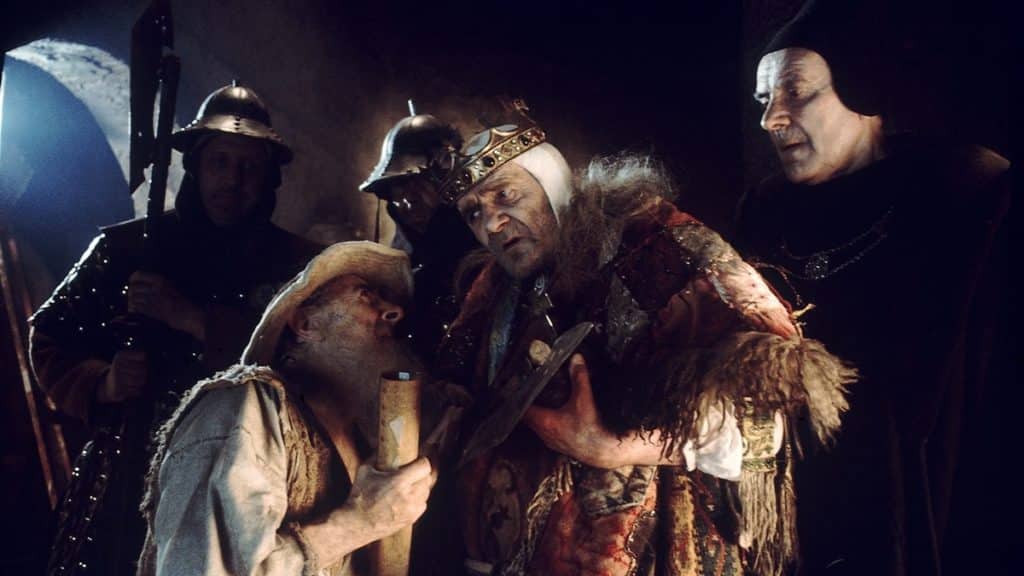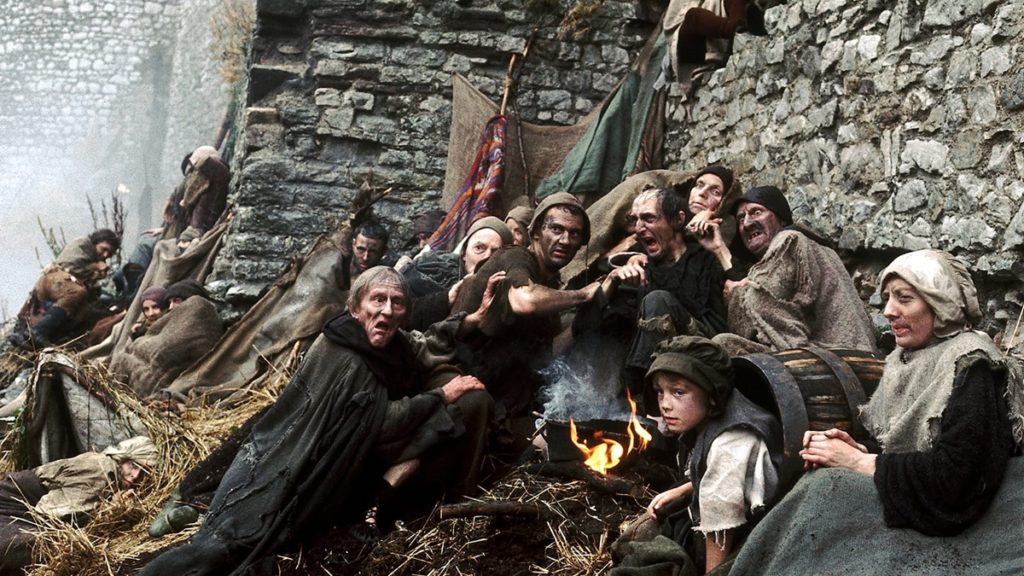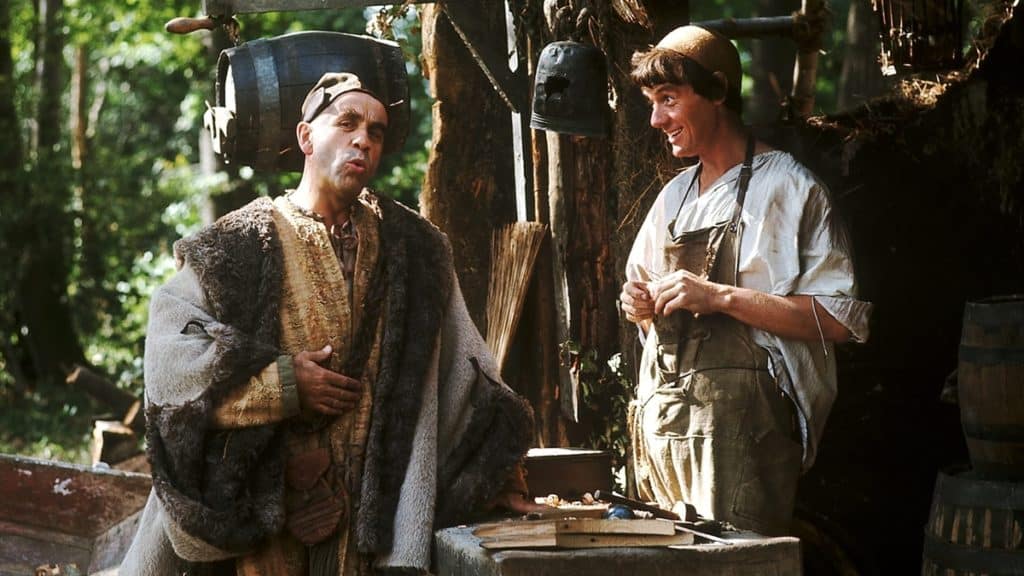Read also:
How to Watch FX Live Without CableHow To Watch AMC Without CableHow to Watch ABC Without CableHow to Watch Paramount Network Without CableTerry Gilliam’s first solo directorial effort is a cracked fairy tale that hints at his artistic future.
Jabberwocky, Terry Gilliam’s solo directorial debut, is a fractured fairy tale of sorts that remains as bizarre and unique today as when it first hit theaters in 1977. It is ostensibly a PG-rated fantasy with all the elements one might associate with such a prospect. There’s (Spoiler Alert) a stalwart hero, a beautiful princess, a fearsome beast, a kingdom in peril, and a happy ending. However, it skews them in strange and occasionally gruesome ways until none plays out as expected. Although admittedly uneven in parts, the result is an undeniably entertaining and occasionally outrageous work. It serves as an impressively formed and executed debut of one of the era’s more compelling and unusual filmmaking voices.
Although Monty Python and the Holy Grail proved a cult favorite, the arduous production and splitting directorial duties with Terry Jones had left Gilliam frustrated with collaboration. As a result, he was determined to do a project independently. Initially, he had his eye on what eventually became All This and World War II (1976), a deeply weird recounting of WWII through the juxtaposition of old newsreel footage and Beatles’ covers from artists ranging from The Bee Gees to Peter Gabriel to Keith Moon. Sensing Gilliam’s disinterest in the project, one of the producers asked him what he would like to do instead. Gilliam proposed a film set in the Dark Ages that would allow him to utilize ideas that he didn’t in Holy Grail. In what would prove to be a rarity for Gilliam, the funding, though low, came soon after. Like that, he was off making his film.

Fellow Python member Michael Palin stars as Dennis Cooper, a young man working as an apprentice to his father in his barrel-making business. His preference for maximizing profits over craftsmanship earns him nothing but scorn and a deathbed rebuke from the old man. After his father’s death, Dennis decides to travel to the kingdom’s capital. There he plans to make his fortune so that he may return and marry the love of his life, Griselda Fishfinger (Annette Badland). Griselda, it should be noted, has no discernible interest in Dennis or his plans. Her only reaction to his declaration is to toss a rotting potato at him offhandedly. The message is clear, but he delusionally keeps it as a totem representing her love.
As it turns out, the kingdom, under the rule of the aptly-named King Bruno the Questionable (Max Wall), has been under siege. A savage monster has been attacking nearby villages and decimating the population. When Dennis arrives in the city, he finds it teeming with displaced refugees exploited by local merchants who have increased their prices in response to the new demand. Unable to find work, Dennis befriends Ethel (Harry H. Corbett). Ostensibly the squire for the Knight of Red Herring (played by a pre-Star Wars David Prowse), Ethel is far more interested in carrying on with the tavern keeper’s wife. Inevitably, the tavern keeper becomes convinced that Dennis is the romantic rival.

To combat the monster, the king proposes a jousting contest in which the winner will be the kingdom’s champion. If they then defeat the monster, they will be named a prince and presented with half the kingdom and the hand of his fair-but-quite-mad daughter, the Princess (Deborah Fallender). After a protracted and gruesome contest, Red Herring secures victory. Since Ethel would prefer to stay behind with the tavern owner’s wife, he browbeats the manifestly unsuitable Dennis to become Herring’s squire. To complicate matters further, the local merchants hire the Black Knight (also played by an always armored Prowse) to kill Red Herring. With the monster free to spread terror, they can keep their price-fixing going and let the profits roll in. It all leads to the predictable confrontation between the creature and Dennis. Suffice it to say, however, it plays out as anything but predictable.
There are several connections between Jabberwocky and Holy Grail—eagle-eyed viewers can even briefly spot the Holy Hand Grenade at one point—but those going into this film expecting a spiritual sequel are in for a rude awakening. Holy Grail is one of the great screen comedies of all time. Still, from a storytelling perspective, it is essentially a collection of sketches strung together for 90 minutes that ends abruptly without a proper conclusion.
The story also shows Gilliam taking his first stab at themes and ideas that he would continue to explore throughout his work.
Jabberwocky does contain some spectacularly funny stuff. For instance, there’s the opening Jaws parody where a poacher—played, not coincidentally by Terry Jones—is killed by the creature. However, Gilliam and co-writer Charles Alverson have elected to present an actual storyline, complete with a forward-moving narrative devised to do more than deliver jokes. Admittedly, the story does sag in the middle section. Nonetheless, you come away from it feeling like you have seen a fully fleshed-out story.
The story also shows Gilliam taking his first stab at themes and ideas that he would continue to explore throughout his work. There is a scornful take on the dangers of capitalism represented by the local merchants handsomely profiting off of human misery. The film also illustrates his first depictions of a stagnant bureaucracy so innovation-averse that it is crumbling from within. Additionally, Jabberwocky takes issue with happy endings by presenting a conclusion that mimics such a conclusion while leaving the lead with nothing he truly wants.

If Gilliam was assuming that Jabberwocky would be judged entirely on its own merits without any comparisons to Holy Grail or Python in general, he was quickly disabused of that notion when the film hit theaters. Inevitably, most critics–even those that liked it–compared it to Python rather than tackle it on its own merits. Distributors did their best to play up the Python connection despite Gilliam’s complaints—even going so far as to bill it as Monty Python’s Jabberwocky in some situations. When fans of Holy Grail came into it expecting more of the same, they were not particularly pleased. People generally did not respond especially well to the amount of gore on display, either, which was pretty elevated for a movie with a PG rating.
With the passage of time and Gilliam’s ascendancy as a filmmaker with a distinct personal vision, the reputation of Jabberwocky has improved. While it is too uneven to be considered a top-tier effort like Brazil, The Adventures of Baron Munchausen, or Fear and Loathing in Las Vegas, it is nevertheless a solid effort. It is all the more impressive for the amount of mileage Gilliam wrung out of his meager budget. But, like the filmmaker’s oeuvre as a whole, it may be just a bit too weird ever to be accepted by the masses. Those not afraid of such things, though, owe it to themselves to give it a look.